
Over the weekend, Democracy Now! host Amy Goodman visited demonstrators at Occupy Louisville, a protest inspired by Occupy Wall Street. They’ve set up an encampment right across the street from a local jail. We hear from veterans, students, social justice activists, and other community members who spent the night at the protest. [includes rush transcript]
Transcript
AMY GOODMAN: Over the weekend, I was in Louisville, Kentucky, where I went down in the middle of the night to Occupy Louisville. Let’s take a listen to what people there had to say, beginning with a vet, a vet of the Gulf War.
BRIAN SMITH: My name’s Brian Smith. I’m from Louisville, Kentucky. And I’m here because this is our moment to stand up and to voice the grievances—to voice what we’ve all been thinking of for a long time. The system does not work for us. The system works against us. The politicians we’ve elected are not looking out for our best interests. And we’re here to tell them that we’re no longer going to put up with that. We’re here to put fear in them. They’re running scared right now. They’re trying to divide us. They’re trying to denigrate the movement. We’re not going to allow that to happen. We’re going to stand together. We’re going to stand united. And we’re going to show them what it looks like when millions of people take to the streets demanding their rights.
I’m a veteran, and I’m pretty disgusted that—just recently it came out—that the largest banks around the country were taking advantage of a VA home loan refinancing system. It’s a government program designed to help veterans refinance their home loans. And all of a sudden, all these banks got together and decided, “We’re going to find a way to charge hidden fees. We’re not allowed to charge attorney fees under this program, so we’re going to find a way to charge hidden fees in order to recoup those losses that we would otherwise not get on the free market.” So, apparently, they all came up with the same idea at the same time. In my idea, that’s collusion. I’m talking about Bank of America. I’m talking about Citibank. I’m talking about PNC, which is right behind us. They were all part of this collusion to basically violate the contract that the government has with veterans to take care of them. And they took advantage of a government program. They’re willing to take government money to line their own pockets. That infuriates me. And that’s just the latest thing.
AMY GOODMAN: How about you? Why are you here today?
GARY JAMES JOHNSON: Well, my name is Gary James Johnson. I’m here because it’s—you know, I’ve been viewing this for a while now. I’ve sat through and seen things that are not right, with the government, the government policies. I’m ex-military, and I can barely even get a job right now. I have to—
AMY GOODMAN: Where did you serve?
GARY JAMES JOHNSON: I served in Iraq for about a year and a half. I joined the military because I thought it was my obligation to help protect this country, to also, you know, just do something, because I was really, you know, eager to do something that would help everybody, you know? And right here, right now, this is another way I can help, and help people out, that—who won’t speak up, who won’t sit there and take a stand, who’s too afraid that they might lose their jobs, may sit there and lose their houses, might get their houses foreclosed. They might sit there and take away people’s houses—they could sit there and take away people’s houses, they could take away their cars, but they can’t take away their voice. That’s in the Constitution.
AMY GOODMAN: How about you?
DEBORAH CARVIN: Name?
AMY GOODMAN: Your name and why you’re here, where you’re from?
DEBORAH CARVIN: Oh, my name is Deborah Carvin, and I’m from Louisville. And, oh, there’s so much to say. I have a college—you know, I have a bachelor’s degree in psychology. I was a social worker for a long time. I have narcolepsy and some other stuff, but—I wish I had it with me, but I still owe $71,000 for my student loans. And what scares me is I have a 21-year-old daughter, and, you know, everybody tells her, “Go to school, go to school.” I don’t know what to tell her. You know, I don’t want her to, you know, end up like me and have this huge debt over her.
AMY GOODMAN: Hi. What’s your name?
MIKAL FORBUSH: Mikal Forbush. I am the program coordinator for the Muhammad Ali Institute for Peace and Justice.
AMY GOODMAN: Ah, which does what?
MIKAL FORBUSH: We are a social justice-based organization. We deal with peace building, violence prevention in—with urban youth. So, since I’ve been here, we have established a small community. We have people who are here who are without shelter. We have middle class. We have some poor people. We have students. We have unemployed. However, we’ve all come together and bonded over this experience, and we are all learning from each other and dealing with our own kind of personal privileges and how we move past that to create something that’s better.
AMY GOODMAN: And how have the authorities dealt with this?
MIKAL FORBUSH: Louisville’s police department has been—I guess, for the situation, they’ve done what they felt was best. They have not been antagonistic, to a certain extent; however, they have not been exactly helpful. We’ve had our issues, but none like New York or Denver, Cincinnati.
AMY GOODMAN: Have there been arrests here?
MIKAL FORBUSH: None. But we have had some incidents of racial profiling. However, there hasn’t been any arrests.
AMY GOODMAN: And what do you think Muhammad Ali would say about this?
MIKAL FORBUSH: I believe Muhammad Ali would be behind this. I believe that his core values, his core principles, are in this movement. He has a center up the street. And if you go and look at his core values, they are embodied in this movement, not only for people standing up for themselves, but also the conviction that we have to remain in this space.
AMY GOODMAN: And your name and…?
PAM NEWMAN: My name is Pam Newman, and I live here in Louisville, but I’m originally from Philadelphia, Pennsylvania.
AMY GOODMAN: And what brings you out to Occupy Louisville?
PAM NEWMAN: I’m excited! I’m excited, for a change! You know? I’m 30 years old, and I feel like the conversation throughout my entire generation has just been like, “It’s going to be OK. Just get an education. Everything is going to be all right.” And you know what? I’m educated, and everything is not all right, you know? And because I’ve been paying attention for so long, I’ve been very frustrated, in that I didn’t know what to do. Like, how do I make a change? Like, I want to make a change, and I want to see difference. I want to see a difference in the life of myself and the people around me, like not just myself, but the society that I live in.
AMY GOODMAN: Change in what way? Around what issues?
PAM NEWMAN: Around finance, in general, about how there’s this pinnacle of money that lives over people, like it’s finances over people. The bank statements are more important than people being able to eat, having a safe place to live, being able to get a job after receiving said education, being able to pay for that education with the job that you may or may not get, and being able to say we’re making this long, arduous process something that we can turn into change. Because I’ve been sitting in front of a computer, like, “Ah, man! That’s messed up!Ah, man! That’s messed up!” and watching TV and saying, “Man! That’s messed up! Somebody should do something about that. How do I—how do I be a part of that process of changing it?” And then Wall Street happened. And I was like, “Huh, that’s interesting. I hope that they’re able to do that for more than a day.” And they did. And then it was the next day, and the next day. And then Louisville did it. And I was like, OK, all right, I’ve got to get on board with this and be a part of it and make it happen and make it sustainable, so that we can have our voices heard and change that conversation.
AMY GOODMAN: What is your name?
PAM’S MOM: Well, I’m Pam’s mom. And everybody calls me “Pam’s Mom.” And if you all have a way of getting our words to the honorable President Barack Obama, I would like for him to know that healthcare is not affordable. Medicare is not affordable. And we need a system that can care for the young, with healthy children visits, as well as the old.
AMY GOODMAN: Some of the people who are occupying Louisville right now. They’re right across from the jail. I met up with them on Saturday night, oh, just around midnight in Louisville, Kentucky.

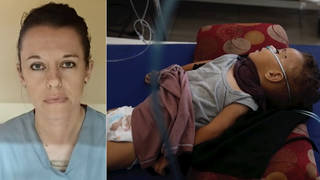
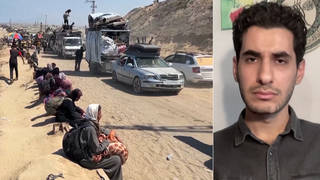
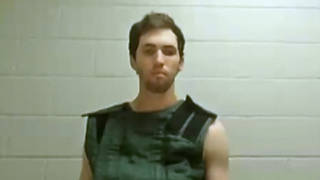
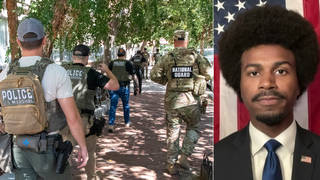






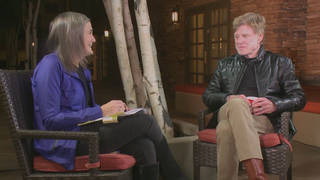
Media Options